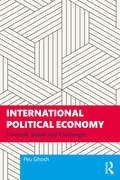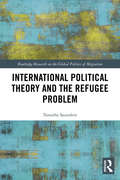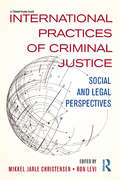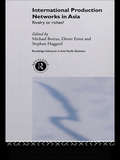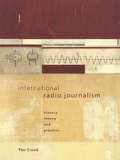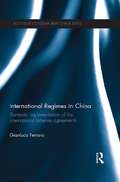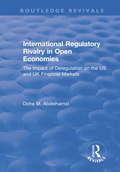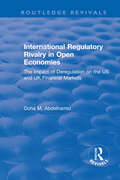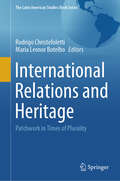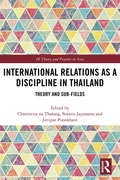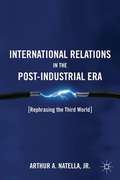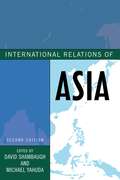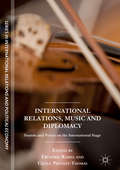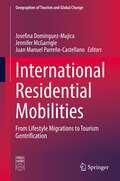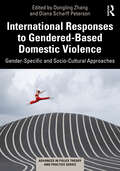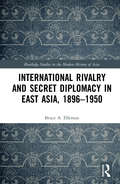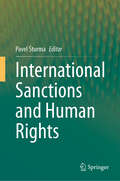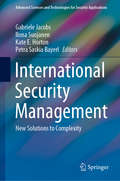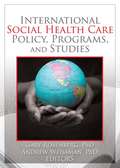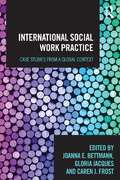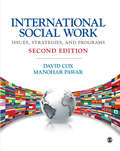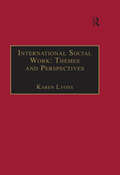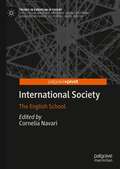- Table View
- List View
International Political Economy: Contexts, Issues and Challenges
by Peu GhoshThis book is a comprehensive introduction to the theories and recent debates on international political economy (IPE). It illustrates the theoretical ideas of the discipline and provides an in-depth understanding of regional and global political economy. The book focusses on the functioning of states and the economy within the perspective of world politics. It explores the theories realism, liberalism, liberal interdependence, hegemonic stability and dependency vis-à-vis the contemporary global economic and political scenario. It provides a historical overview of the developments in the field and study of IPE, institutions such as the International Monetary Fund, World Bank and World Trade Organization; the effects of globalization; the movement of capital; and the contested relationship between human development and democracy. The book examines the effects of neoliberal policies on the functioning of states and highlights the challenges and dilemmas of prioritizing development especially for developing countries. The author also looks at regional formations like the EU, NAFTA, ASEAN, SAARC, APEC and BRICS and their contributions to political and economic cooperation and trade. The book will be useful to the students, researchers and faculty working in the fields of political economy, international relations, economics, political science and development studies.
International Political Theory and the Refugee Problem
by Natasha Saunders‘The refugee problem’ is a term that it has become almost impossible to escape. Although used by a wide range of actors involved in work related to forced migration, these actors do not often explain what exactly ‘the problem’ is that they are working to solve, leading to an unfortunate conflation of two quite different ‘problems’: the problems that refugees face and the problems that refugees pose. Beginning from the simple, yet too often overlooked, observation that how one conceives of solving a problem is inseparable from what one understands that problem to be, Saunders’ study explores the questions raised about how to address ‘the refugee problem’ if we recognise that there may not be just one ‘problem’, and that not all actors involved with the refugee regime conceive of their work as addressing the same ‘problem’. Utilising the work of Michel Foucault, the book first charts how different ‘problems’ lend themselves to particular kinds of solutions, arguing that the international refugee regime is best understood as developed to ‘solve’ the refugee (as) problem, rather than refugees’ problems. Turning to the work of Hannah Arendt, the book then reframes ‘the refugee problem’ from the perspective of the refugee, rather than the state, and investigates the extent to which doing so can open up creative space for rethinking the more traditional solutions to the refugee (as) problem. Cases of refugee protest in Europe, and the burgeoning Sanctuary Movement in the UK, are examined as two sub-state and popular movements which could constitute such creative solutions to a reframed problem. The consequences of the ‘refugee’ label, and of the discourses of humanitarianism and emergency is a topic of critical concern, and as such, the book will form important reading for a scholars and students of (international) political theory and forced migration studies.
International Practices of Criminal Justice: Social and legal perspectives
by Mikkel Jarle Christensen and Ron LeviInternational Practices of Criminal Justice: Social and Legal Perspectives examines the practitioners, practices, and institutions that are transforming the relationship between criminal justice and international governance. The book links two dimensions of international criminal justice, by analyzing the fields of international criminal law and international police cooperation. Although often thought of separately, each of these fields presents criminal justice as a governance method for resolving international challenges and crises. By focusing on examples from international criminal tribunals, transitional justice, transnational crime, and transnational policing and prosecution, the contributors to this collection all examine how criminal justice is unmoored from the state, while also attending to the struggles and challenges that emerge when criminal justice is used as a form of international action. International Practices of Criminal Justice: Social and Legal Perspectives breaks new ground in criminology, international legal studies and the sociology of law, and will be of interest to students, scholars, and practitioners across a wide array of fields in criminal justice, international law, and international governance.
International Pricing of Emerging Market Corporate Debt: Does the Corporate Matter?
by Ashoka Mody Sonja KellerA report from the International Monetary Fund.
International Production Networks in Asia: Rivalry or Riches (Routledge Advances in Asia-Pacific Business #No.11)
by Stephan Haggard Dieter Ernst Michael BorrusThe economic crisis of 1997 called East Asia's economic miracle into question and generated widespread criticism of the region's developmental models. However, the crisis did little to alter the growing economic integration of American, Japanese and Chinese firms who have created cross-border production networks. This book addresses the changing nature of high-tech industries in Asia, particularly in the electronics sector, where such networks are increasingly designed to foster and to exploit the region's highly heterogenous technology, skills and know-how.
International R&D Spillovers and Institutions
by Elhanan Helpman David T. Coe Alexander W. HoffmaisterA report from the International Monetary Fund.
International Radio Journalism: History, Theory And Practice (Communication and Society)
by Tim CrookRadio journalists have witnessed much of the history of the twentieth century. From early documentary recordings , to the ground-breaking war reporting of Ed Murrow and Richard Dimbleby, to the sophisticated commentaries of Alistair Cooke and reporters such as Fergal Keane, International Radio Journalism explores the way radio has covered the most important stories this century and the way in which it continues to document events in Britan, America, Europe and many other countries around the world.International Radio Journalism is both a theoretical textbook and a practical guide for students of radio journalism, reporters, editors and producers. The book details training and professional standards in writing, presentation, technology, editorial ethics and media law in America, Britain, Australia and other English speaking countries and examines the major public sector broadcast networks such as the BBC, CBC, NPR and ABC as well as the work of commercial and small public radio stations.Timothy Crook investigates the way in which news reporting has been influenced by governments and media conglomerates and identifies an undercurrent of racial and sexual discrimination throughout the history of radio news. There are chapters on media law for broadcast journalists, the implications of multi-media and new technologies, digital applications in radio news, and glossaries which cover the skills of voice presentaion, writing radio news and broadcast vocabulary.
International Regimes in China: Domestic Implementation of the International Fisheries Agreements (Routledge Contemporary China Series)
by Gianluca FerraroAccording to the Food and Agriculture Organization (FAO) of the United Nations, more than 80% of world’s fish stocks are fully exploited, over-exploited, depleted, or recovering from depletion. Although several international agreements have promoted more responsible fisheries, coastal states have usually maintained national policies that enable higher harvest levels rather than greater conservation of fish stocks, and international agreements for more responsible fisheries have generally experienced a weak domestic implementation. Among the major coastal fishing states, China constitutes the largest fish producer and main exporter in the world, and therefore presents a fascinating case-study for the domestic implementation of international fisheries agreements. This book investigates the degree to which China has complied with the international agreements it has signed, and asks why it is failing to meet expectations. Crucially, it calls for greater emphasis on the political, rather than technical, issues involved in the implementation of international regimes. In turn, it examines how understanding the case of China can help us to develop solutions for improved international compliance in the future. Providing an improved understanding of the implementation of international regimes, alongside an in-depth study of China’s political system, policy-making and compliance, this book will be of great interest to students and scholars of Chinese studies, international relations, public policy, and international law and environmental studies. It will also be useful for policy makers working in the fields of environmental regulation and fisheries management.
International Regulatory Rivalry in Open Economies: The Impact of Deregulation on the US and UK Financial Markets (Routledge Revivals)
by Doha M. AbdelhamidThis title was first published in 2003. This text aims to fill a gap in the literature for a text on the theory and practice of international regulatory competition in the open financial markets of the US and UK.
International Regulatory Rivalry in Open Economies: The Impact of Deregulation on the US and UK Financial Markets (Routledge Revivals)
by Doha M. AbdelhamidThis title was first published in 2003. This text aims to fill a gap in the literature for a text on the theory and practice of international regulatory competition in the open financial markets of the US and UK.
International Relations and Heritage: Patchwork in Times of Plurality (The Latin American Studies Book Series)
by Rodrigo Christofoletti Maria Leonor BotelhoPatchwork in times of plurality encompasses the multitude of actions as a revealing symbol of ethos, actors, organisms, and manifestations of preservation and dialogue frontiers. This plural metaphor, almost like a patchwork, aggregates and yet segregates, conforms, but disfigures, and boosts the meanings which represent this new field that international relations have been recently crossing. Just like the mirror metaphor - that reflects everything to all and, sometimes, intervenes in distortions - the patchwork analogy allowed the book to take responsibility for the disclosure of preservation actions on a global scale. The book has a pioneering role insofar since it is the only publication with such characteristics, concerns, and coverage. The work studies the interconnection between cultural properties and international relations by understanding them as a mosaic before the bridges that intertwine people and borders. The main goal of this work is to illustrate in what way intergovernmental relations have been privileging heritage and culture as acting fields for its broader needs. Therefore, the book addresses topics related to the international agenda, focusing on its less debated themes. Two examples of these undervalued matters are the link between actors, preservationist actions, and the universe of world cultural heritage. The book also pursuits a critical dialogue between interdisciplinary fields that narrow heritage frontiers in search to contribute with a spectrum of academic perspectives and (inter)national study cases. To serve distinct economic, social, or political purposes, institutionalized heritage (embodied by different values) becomes instrumentalized in a top-down direction. In a development frame, when we perceive culture as indispensable to human life, the past is transformed into exchange currency. Through the creation of alternative fields of action, usually in a bottom-up logic, the present builds new heritage connections. Digital heritage's preservation, dissemination, and appreciation have been representing these same nets.
International Relations as a Discipline in Thailand: Theory and Sub-fields (IR Theory and Practice in Asia)
by Chanintira Na Thalang Soravis Jayanama Jittipat PoonkhamThere has long been considerable debate about the nature of non-Western IR theory. Most attempts to understand such a phenomenon begin by taking a top-down approach on a country by country basis. Instead, this book takes a bottom-up approach, involving specialists from a range of Thai universities, revealing the contours of the Thai IR community. It examines the state of various sub-fields under the IR rubric in Thailand such as foreign policy analysis, security studies, international political economy and area studies, and how Thai thinkers in these fields have contributed to IR as a discipline and IR theory development in Thailand. In doing so, it identifies factors unique to Thai academia which have hindered the development of an indigenous-sourced theory as well as exploring the similarities shared with other non-Western contexts that have posed an obstacle to the creation of a more general non-Western IR theory. Providing both an in-depth insight into the specific phenomena of Thai IR theory, and a broader perspective on the challenges of formulating non-Western IR theory, this book aims to push the debate on non-Western IR theory forward. It will be of particular interest to readers looking for a better understanding of IR theory in Thailand, but also for those more generally looking to formulate and characterise non-Western approaches to the discipline.
International Relations in the Post-Industrial Era
by Jr. Arthur A. NatellaThe current emphasis on the greening of the world marks a beginning of a new concern for our relationship with our planet. This book states that we are entering into a new era - a transitional time in history in which the values of the industrial revolution are being replaced by a post-industrial consciousness.
International Relations of Asia (Asia in World Politics)
by David Shambaugh Michael Yahuda Shambaugh YahudaAs the world's most dynamic region, Asia embodies explosive economic growth, diverse political systems, vibrant societies, modernizing militaries, cutting-edge technologies, rich cultural traditions amid globalization, and strategic competition among major powers. As a result, international relations in Asia are evolving rapidly. In this fully updated and expanded volume, leading scholars from Asia, Europe, and North America offer the most current and definitive analysis available of Asia's regional relationships. They set developments in Asia in theoretical context, assess the role of leading external and regional powers, and consider the importance of subregional actors and linkages. Combining interpretive richness and factual depth, their essays provide an authoritative and stimulating overview. Students of contemporary Asian affairs--new to the field and old hands alike--will find this book an invaluable read. Contributions by: Amitav Acharya, Sebastian Bersick, Nayan Chanda, Ralph A. Cossa, Michael Green, Samuel S. Kim, Edward J. Lincoln, Martha Brill Olcott, T.V. Paul, Phillip C. Saunders, David Shambaugh, Sheldon W. Simon, Scott Snyder, Robert Sutter, Hugh White, and Michael Yahuda
International Relations, Music and Diplomacy
by Frédéric Ramel Cécile Prévost-ThomasThis volume explores the interrelation of international relations, music, and diplomacy from a multidisciplinary perspective. Throughout history, diplomats have gathered for musical events, and musicians have served as national representatives. Whatever political unit is under consideration (city-states, empires, nation-states), music has proven to be a component of diplomacy, its ceremonies, and its strategies. Following the recent acoustic turn in IR theory, the authors explore the notion of “musical diplomacies” and ask whether and how it differs from other types of cultural diplomacy. Accordingly, sounds and voices are dealt with in acoustic terms but are not restricted to music per se, also taking into consideration the voices (speech) of musicians in the international arena.Read an interview with the editors here: https://www.sciencespo.fr/ceri/en/content/international-relations-music-and-diplomacy-sounds-and-voices-international-stage
International Residential Mobilities: From Lifestyle Migrations to Tourism Gentrification (Geographies of Tourism and Global Change)
by Josefina Domínguez-Mujica Jennifer McGarrigle Juan Manuel Parreño-CastellanoThis book assesses the drivers and impacts of new international residential mobilities by considering a range of mobilities in different countries across the globe from investment, amenity and retirement mobilities to those of the new global middle class and the transnational elites. It examines the intersection of these mobilities with the increase in the volume of global tourism, the advent of the sharing economy and peer-to-peer platforms, and the effects of transnational property investment. The consequent transformations are considered in urban environments where tourism pressure coexists with gentrification, increasing house prices and processes of social and ethnic segregation. By offering a broad perspective based on different case studies, the book portrays the contradictory consequences of international residential mobilities both favouring local opportunities for development and disrupting housing markets through the disassociation from local demand. As a result this book is a great resource for academics and students in tourism, urban and migration studies as well as policy-makers and practitioners involved in urban planning, social affairs and tourism management.
International Responses to Gendered-Based Domestic Violence: Gender-Specific and Socio-Cultural Approaches (Advances in Police Theory and Practice)
by Diana Scharff Peterson Dongling ZhangThis edited volume represents a joint effort by international experts to analyze the prevalence and nature of gender-based domestic violence across the globe and how it is dealt with at both national and international levels. With studies being conducted in 20 different countries and 4 distinct regions, the contributors to this volume shed light on the ways in which contextual particularities shape the practices and strategies of addressing the socio-cultural and legal problem of gender-based domestic violence in the countries or regions where they do research. Special attention is devoted to developing countries where there is a lack of a consistent legal definition of gender-based domestic violence and where violence against women is widely considered a private matter. The authors of the chapters share a common goal of raising public awareness of the significance in nuanced local experiences of women and other individuals from gender and sexual minority groups facing gender-based violence. Furthermore, the authors attend, analytically, to the newly emerging, overlapping influences of COVID-19 and global warming. Their research findings acknowledge and provide a detailed account of how the two ecological and socio-economic crises can combine to produce economic devastation, disconnect victims from necessary social services and assistance, and create a large degree of panic and uncertainty. In addition, they intend to offer insights into next steps to not only adjust existing public policies, legislation, and social services to the ever-changing national and global contexts, but also to make new ones. The book is intended for a wide range of scholars (both professors and students) and practitioners in a large number of areas, including but not limited to criminal justice, criminology, law, human rights, social justice, social work, nursing, sociology, and political or public affairs.
International Rivalry and Secret Diplomacy in East Asia, 1896-1950 (Routledge Studies in the Modern History of Asia)
by Bruce A. EllemanEast Asia was a major focus of struggle between the United States and the Soviet Union during the Cold War of 1945 to 1991, with multiple "hot" and "cold" conflicts in China, Korea, and Vietnam. The struggle for predominance in East Asia, however, largely predated the Cold War, as this book shows, with many examples of the United States and Russia/the Soviet Union working to exercise and increase control in the region. The book focuses on secret treaties, 26 of them, signed from the mid-1890s through 1950, when secret agreements between China and the USSR, including several concerning the Chinese Eastern Railway, gave Russia greater control over Manchuria and Outer Mongolia. One of the most important was negotiated in 1945, when Stalin signed the Sino-Soviet Friendship Treaty with Chiang Kai-shek and the Chinese Nationalists, that included a secret protocol granting the Soviet Navy sea control over the Manchurian littorals. This secret protocol excluded the US Navy from landing Nationalist troops at the major Manchurian ports, thereby guaranteeing the Chinese Communist victory in Northeast China; from Manchuria, the Chinese Communists quickly spread south to take all of Mainland China. To a large degree, therefore, this formerly undiscussed secret diplomacy set the underlying conditions for the Cold War in East Asia.
International Sanctions and Human Rights
by Pavel ŠturmaThe word "sanctions" is currently used more than ever before not only in the media, political statements, but also in legal discourse. Apart from this very widely cited term, European Union documents tend to refer also to "restrictive measures" while international law parlance embraces the concept of "countermeasures" (being the modern equivalent of peaceful reprisals from the point of view of general customary international law), i.e. individual coercive measures, or "security measures", which is a term used in some treaties. Sanctions or measures, whatever they are called, are a necessary and legitimate response to Russian aggression in Ukraine in the current situation. However, this does not rule out certain legal problems. The nature of these measures must be assessed in the light of international law. From this point of view, finding answers to the following questions is essential. Is the content of these measures generally consistent or contrary to the rules of international law? Who is authorized to decide on the introduction and content of these measures? Can these measures produce extraterritorial effects? Do sanctions targeting individuals (natural and legal persons) violate their human rights (right to property, right to fair trial, etc.)? Which type of information can be used as a basis for imposing sanctions against these individuals? Are there sufficient procedural safeguards and remedies at national and international level? Can some restrictive measures be reviewed and possibly overturned by courts? Are individuals who have been wrongfully added on sanction lists entitled to any compensation?
International Security Management: New Solutions to Complexity (Advanced Sciences and Technologies for Security Applications)
by Petra Saskia Bayerl Gabriele Jacobs Ilona Suojanen Kate E. HortonThis book offers a new look at international security management combining practical applications and theoretical foundations for new solutions to today’s complex security and safety challenges. The book’s focus on safety as a positive experience complements the traditional approach to safety as risks and threats. In addition, its multi-stakeholder, multi-disciplinary, international and evidence-based approach provides holistic and timely insights for the field. Topics raised in this book focus on the crucial questions of: Who is safety actually for? (and) How can sustainable safety solutions be jointly created? This book provides comprehensive insights into the latest research findings, practical applications and suggestions for dealing with challenges in international security management in integrated and sustainable ways, making it relevant reading for practitioners, as well as academics and students - with a view to obtaining thorough, first-hand knowledge from serving experts in the field. We explore new ways of working with citizens, police and policymakers in order to co-create safety. This book emphasises the importance of safety as a topic that matters for all.“Safety and security are basic pillars for the development of our society. However, the number of areas, actors and procedures involved in the management of the different elements composing the international security eco-system, its coordination and alignment, make it a challenging issue to resolve. This book provides a fresh new approach to this complex issue, in which we all have a role to play.”Fernando Ruiz, Acting Head of European Cyber-Crime Centre - Europol “A very timely analysis that brings a much-needed international perspective to the field of security management. The authors explore the challenges confronting security management in a complex and connected world and generate new ideas to support practice and inspire research.” Professor Mark Griffin; John Curtin Distinguished Professor, Curtin University; Director, Future of Work Institute “This book presents the role of International Security Management in the 21st century in an innovative way.”Dr. Christian Endreß, Managing Director, ASW Bundesverband - German Association for Security in Industry and Commerce
International Social Health Care Policy, Program, and Studies
by Andrew Weissman Gary RosenburgNoted experts provide practical, effective strategies to meet global health challengesInternational Social Health Care Policy, Program, and Studies presents a collection of papers drawn from the Ninth Doris Siegel Memorial Fund Colloquium that focuses on social work and international health issues, emphasizing an international exchange and cooperation as a crucial facet of meeting global health challenges. Honoring the memory and spirit of social work pioneer Doris Siegel for her accomplishments and advocacy on behalf of social-health issues, this fine selection of scholarly papers explores ideas and strategies from around the world which offer greater opportunity for success for diverse social work and health care problems. Internationally recognized practitioners and academics offer research and case studies illustrating approaches, programs, and policies that any practitioner or policymaker may find helpful.International Social Health Care Policy, Program, and Studies closely examines the common ground in social health care problems shared by various countries worldwide. Issues such as the effects of terrorism, academic-practice partnerships in practice research, and the international exchange program are explored, with insightful discussions that explain in which directions to best channel social and health care energies and resources. Helpful figures and tables further explain concepts and research.Topics in International Social Health Care Policy, Program, and Studies include: Strength-focused and Meaning-oriented Approach to Resilience and Transformation (SMART) as a model of crisis intervention that uses a holistic view of health outpatient commitment as a delivery system assisted conception and social work needs in the United Kingdom a study on the psychological distress between elderly Israeli residents and immigrant family caregivers impact of prolonged terrorist attacks on children and adolescents in Israel stress experienced by social workers working with terror victims integration of social workers into hospital disaster response teams in Australia academic practice research partnerships for health social workers evaluation of the outcomes from the Mount Sinai Social Work Leadership Enhancement Program discussion of the lessons learned from the 75-year history of health social work in Melbourne, Australia and more!International Social Health Care Policy, Program, and Studies is horizon-expanding reading that is perfect for social workers dealing with a global community, social work libraries, educators, students, and libraries of all types.
International Social Work Practice: Case Studies from a Global Context
by Joanna E. Bettmann Gloria Jacques Caren J. FrostInternational Social Work Practice compares and contrasts divergent social work approaches in countries around the world, providing students with a unique perspective on social work as it is actually practised. Using case studies from frontline practitioners from across the globe, this innovative new textbook stimulates critical thinking about international social work practice issues. Providing a review of both country-specific social work practices and universal social work issues, the text looks at a variety of core social work topics, framed here in terms of CSWE competencies. Set within a theoretical framework presented in the introductory chapter, the subjects covered include: child welfare intimate partner violence family conflict and communication elder care substance abuse trauma. Each chapter presents several case studies exploring range of issues within the broader topic and each case study is commented on by two narratives from social work academics and practitioners from different countries, providing different cultural perspectives. Taking a practical hands-on approach, this text includes a dedicated section for classroom use, with discussion questions, classroom exercises and additional cases for your own analysis. It will be particularly useful to BSW and MSW students taking courses in international social work, practice, social welfare and human behaviour.
International Social Work: Issues, Strategies, and Programs
by Manohar Pawar Dr David R. CoxInternational Social Work: Issues, Strategies, and Programs, Second Edition draws together the practice wisdom emerging within the broad scope of international social work practice and its role in contributing to the international community's efforts in combating the major global social problems of poverty, conflict and postconflict reconstruction, the development of countries and disadvantaged populations, migration and displacement, and the needs of specific populations such as child soldiers and AIDS orphans. Utilizing an integrated perspectives approach incorporating global, human rights, ecological and social development perspectives, the International Social Work, 2e is designed to prepare social workers, human services professionals, development practitioners who desire to play significant roles in responding to modern global challenges that are critical to the well-being of people, communities, nations and ultimately of us all.
International Social Work: Themes and Perspectives
by Karen LyonsThis book advocates the development of international social work, both as offering an important perspective on practice at local level and as a distinct form of cross-border and supra-national activity. The author argues that the effects of globalization and regional policies on the welfare sector have implications for the users of social services and community development programmes which require all social professionals to have a better understanding of these processes and consequences and of the international networks through which they themselves might operate. Some of the material used is of a comparative nature, for instance in relation to the education of social professionals or their relationship with the state or the family and examples are drawn from a wide range of countries. But there is also a thematic treatment of three phenomena which are seen to have significant international dimensions, that is, poverty, migration and disasters. The book considers the role of social professionals in relation to these themes and identifies greater scope for intervention in relation to a range of social problems at international levels.
International Society: The English School (Trends in European IR Theory)
by Cornelia NavariThis book provides an introduction to, and analysis of, the English School’s views on International Relations as they developed from the somewhat vague state/ society distinction to the present focus on foundation institutions, regional organisation and the globalization of international society. It focuses on key thinkers and texts and turning points and moves our understanding of the English School beyond the past work of the British Committee to the more recent work of Barry Buzan et. al. to offer a comprehensive overview and interrogation from the leading lights of this arm of International Relations thought. This volume is one of the cornerstones of the EISA’s Trends in European IR Theory series complementing the volumes on International Political Theory, Liberalism, Realism, International Political Economy, the post-positivist tradition, and Feminism published for the centenary of IR as a discipline.
